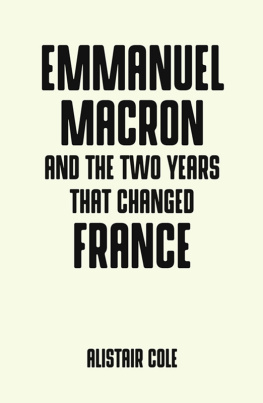France since 1870
France since 1870
Culture, Politics and Society
Third Edition
Charles Sowerwine
Charles Sowerwine 2018
All rights reserved. No reproduction, copy or transmission of this publication may be made without written permission.
No portion of this publication may be reproduced, copied or transmitted save with written permission or in accordance with the provisions of the Copyright, Designs and Patents Act 1988, or under the terms of any licence permitting limited copying issued by the Copyright Licensing Agency, Saffron House, 610 Kirby Street, London EC1N 8TS.
Any person who does any unauthorized act in relation to this publication may be liable to criminal prosecution and civil claims for damages.
The author has asserted his right to be identified as the author of this work in accordance with the Copyright, Designs and Patents Act 1988.
First published 2001
Second edition 2009
Third edition 2018 by
PALGRAVE
Palgrave in the UK is an imprint of Macmillan Publishers Limited, registered in England, company number 785998, of 4 Crinan Street, London, N1 9XW.
Palgrave and Macmillan are registered trademarks in the United States, the United Kingdom, Europe and other countries.
ISBN 9781137406095 hardback
ISBN 9781137406101 paperback
This book is printed on paper suitable for recycling and made from fully managed and sustained forest sources. Logging, pulping and manufacturing processes are expected to conform to the environmental regulations of the country of origin.
A catalogue record for this book is available from the British Library.
A catalog record for this book is available from the Library of Congress.
For
Claude, Frdrique, Anouk, Tabitha, Mabel, Ned, Orvis and Niamh
May they find inspiration in Frances past and in its future.
Contents
List of Maps
1Paris after 1889
2World War I: The Battle of the Marne (September 1914) and the Western Front (No-Mans-Land, November 1914March 1918)
3French Colonies, 1939
4France under German Occupation, 194044
5France: Regions and Regional Capitals, 19822016
6France: Regions and Regional Capitals since 2016
Preface
The Third Republic, with which this book begins, lasted 70 years, making it the longest regime since the Revolution of 1789. The Fifth Republic, with which this book ends, was founded in 1958 and is nearing 60. Will it last as long as the Third? The terrorist act that began the century 9/11 the Iraq War and the destabilization of the Middle East have played out in dramatic and terrifying ways. The terrorist attacks of 2015, 2016 and 2017 laid the basis for significant changes.
At the same time, globalization and the ultra-free-market economics of the twenty-first century (often referred to as neo-liberalism) weighed heavily on France. Attempts to adapt by reducing wages and social support failed in the face of riots, in 2006 as in 1995, but further attempts succeeded: President Sarkozy cut pensions and social services in 2011. Under Hollandes presidency, Emmanuel Macron deregulated many aspects of French life with the 2015 Loi Macron and the 2016 Labour Law. Benefits from these measures have yet to be seen. These economic issues are tied to the European Union and the eurozone. The Maastricht Treaty and the euro significantly constrain states as economic actors and led to austerity policies, contested by populations, in France as elsewhere, but supported or unchallenged by national leaders. These issues not only require treatment in their own right; they also demand a rethink of the history of the preceding decades, particularly those since the 1980s, when Mitterrand came to power and Jean-Marie Le Pens Front national rose to prominence, setting the stage for the 2002 and 2007 presidential elections. In particular, they demand increased consideration of the ways in which the legacy of colonialism has affected contemporary France.
This edition is a thorough revision, seeking to incorporate all these and other contemporary issues. It also seeks to build on the significant advances historians have made. I was astonished at how much important research has been published in less than a decade. It is a tribute to my colleagues around the world, but a weight on the mind of an historian trying to offer a coherent interpretation of recent and contemporary history. John Merriman, Kristin Ross, Robert Tombs and Colette Wilson produced important work on the Paris Commune and its aftermath. Olivier Wieviorka revised the history of the Normandy Landings and through it much of the history of the war. He and Robert Gildea both produced masterful and complementary histories of the Resistance. Philip Nord provided a new history of the post-war period taking further Robert Paxtons argument for continuity from the 1930s and Vichy into the Fourth Republic. Stein Tnnesson revised our understanding of the origins of the Vietnam War. A new generation of French historians reinterpreted May 68 (I think particularly of Xavier Vigna) and the indefatigable Julian Jackson synthesized their findings. He also brought into focus the pre-history of gay liberation with his important work on Arcadie. Rgis Revenin and Michael Sibalis revised our understanding of Third Republic homosexuality. Christine Bard, Paula Birnbaum, Helen Chenut, Rachel Mesch and others gave us new perspectives on feminism and on women and culture.
This edition reflects a change in my own thinking, stimulated by Thomas Pikettys argument that inequality in the west was again increasing after a period of decrease in the middle of the twentieth century. This argument has significant implications for our interpretation of history. I was brought up in the period of post-war prosperity known in France as the trente glorieuses, the thirty glorious years of prosperity from the end of World War II to the oil crises of the 1970s. The values of that period were the foundation of my adult values. They still underpin todays values. If we no longer assume that a prosperous society offering secure employment and gradual reduction in inequality is the norm, we still tend to think that we should and can return to this society, that the present society is an aberration, a blip in history, if a prolonged one. Pikettys argument raises the possibility that the present state of things is the historic norm and that the post-war prosperity was the blip. That possibility needs to be taken seriously. I have thus sought in this edition to keep my inner Whig in check.
Acknowledgements
Many friends and colleagues helped with the first edition and I have acknowledged them there. Some debts are timeless. My late and much-regretted friend Alan Dawley transformed my understanding of World War I by taking me through the battlefields. The late Raymond Aubrac provided information about the vote for womens suffrage and read and 28, making useful corrections and verifications.
For the second edition, Robert Aldrich, Richard Pennell and Ian Coller clarified colonial issues; Ian made many valuable suggestions, especially for . Yvette Roudy helped with the 2007 election campaign, as she helped so generously with my PhD thesis 47 years ago. Carole Fink corrected mistakes in my discussions of international relations. Robert Soucy shared his enormous erudition about the extreme right and read the whole of Part IV. Colin Nettelback engaged in a useful discussion about the Conclusion. The late Tony Judt encouraged me to build on his analysis of Chiracs presidency. Two friends greatly assisted my struggles with philosophy: John Cleary graciously revised the section on Badiou and Russell Grigg gave me a crash course on Lacan.











